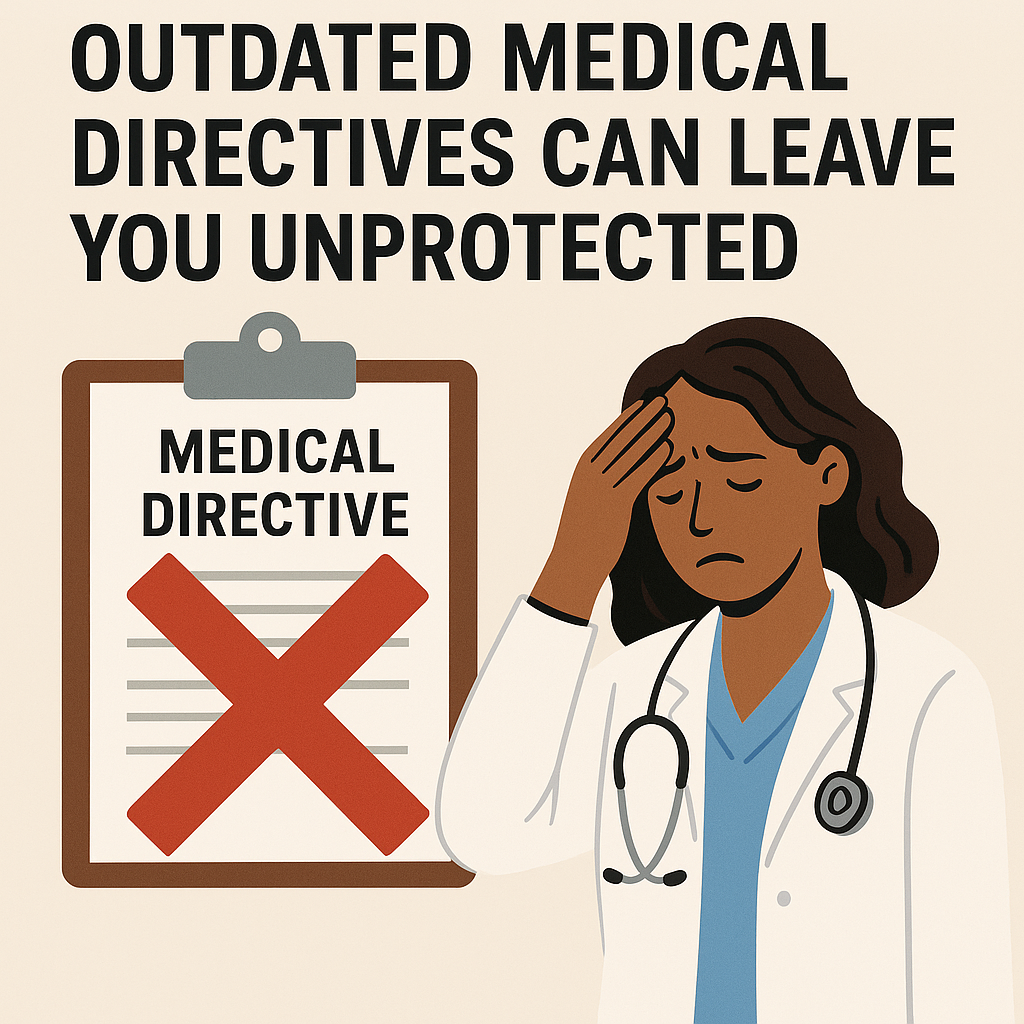Outdated Medical Directives Can Leave You Unprotected
When you think about estate planning, you likely focus on creating a will or setting up a trust. But your medical directives—specifically your healthcare directive or advance healthcare directive—are equally important. These legal documents are meant to guide your medical care if you become unable to make decisions. However, outdated medical directives can cause confusion, delay care, and sometimes even leave you without a clear advocate in times of crisis. At Masterly Legal Solutions, we help you ensure that every document in your estate is current and effective.
The Risk of Letting Medical Directives Go Out of Date
An Emergency Is No Time for Legal Confusion
Medical emergencies are fast-moving and emotionally intense. If your medical directive lists a deceased agent or someone no longer in your life, doctors may be unable to follow the instructions. This gap in care can lead to:
- Delayed treatment
- Confusion among family members
- Involvement of the probate court or legal intervention
- Decisions made against your wishes
Real-Life Examples Show the Cost of Neglect
Consider a person who named their spouse as their healthcare proxy but later divorced. If the directive wasn’t updated, that former spouse could still legally make decisions. In another case, a woman named her brother who moved abroad years ago. When she suffered a stroke, no one could access him quickly enough, causing the hospital to delay urgent care.
These examples aren’t rare. Our experienced estate planning attorneys have seen firsthand how outdated documents disrupt the estate planning process.
How Laws and Medical Practices Evolve Over Time
Legal Standards Change
A document created in 2002 may not meet the current legal standards of your state. States update forms, definitions, and requirements over time. If your directive doesn’t align with current law, your healthcare providers may reject it or require additional verification.
Healthcare Technology and Practices Shift
Your directive might not account for new treatments, terminology, or digital recordkeeping systems. This could hinder your healthcare wishes from being carried out as intended.
Naming the Right Person—And Keeping It Current
The Role of a Healthcare Agent
The person you name in your healthcare directive holds serious responsibility. They could be making decisions about life support, feeding tubes, surgeries, or comfort care. If that person is:
- Deceased
- Estranged
- Living far away
- Incapacitated themselves
...you’re left without a clear voice.
Revisiting Your Directive
An estate attorney should help you review and update your documents if you’ve experienced:
- Divorce
- Death of a named agent
- New marriage or child
- Major move to another state
- Change in medical or financial condition
How Outdated Directives Impact Loved Ones
Family Conflicts and Emotional Stress
Without an updated directive, family members may disagree about your care. The court might appoint someone to act on your behalf—a stranger to your values and preferences.
Risk of Involuntary Measures
Outdated directives can lead to unwanted interventions. You might be kept on life support against your wishes, or denied treatment you would have chosen.
The Dangers of DIY and Online Estate Planning
Online Estate Planning Isn’t One-Size-Fits-All
While online estate planning tools are convenient, they often use generic forms that don’t account for:
- State-specific laws
- Unique family dynamics
- Changes in legal standards
A form you downloaded five years ago might no longer be legally valid.
Expert Guidance Matters
Only an experienced estate planning attorney can provide tailored advice based on your current life circumstances and long-term goals. At Masterly Legal Solutions, our legal experts focus on making sure your documents reflect today’s legal environment and your current values.
Related Estate Planning Documents That May Also Be Outdated
Don’t Stop at Medical Directives
A full estate plan includes:
- Last will and testament
- Revocable living trusts
- Durable power of attorney for financial decisions
- Advance healthcare directive
- HIPAA authorization forms
- Guardianship nominations for minor children
If one is outdated, the others may be as well. You need to regularly prepare, review, and, if necessary, create new legal documents.
When to Review and Update Your Estate Plan
Life Events That Trigger Revisions
Plan to review your estate documents every 3–5 years—or sooner if any of the following occur:
- Marriage, divorce, or new domestic partnership
- Birth or death of a loved one
- Serious illness or diagnosis
- Acquisition or sale of significant assets
- Moving to a new state
Keep Your Entire Plan Synchronized
Each piece of your estate plan should work together. If your last will names a different executor than your power of attorney or medical directive, it can cause confusion and even court intervention.
Avoiding Probate and Medical Delays Through Proper Planning
The Goal: Clear, Actionable, and Legal
When done right, a healthcare directive helps your family avoid emergency legal filings and honors your healthcare wishes. It can help avoid probate, protect your remaining assets, and ensure your affairs are handled by the people you trust.
The Value of Working with Experienced Attorneys
Why Professional Oversight Matters
Our estate planning attorneys do more than fill in blanks. They take the time to:
- Understand your values and priorities
- Evaluate your current documents
- Update language to reflect current laws
- Coordinate your directive with your wills, trusts, and other directives
Personalized, Ongoing Support
Whether you’re starting fresh or updating a 15-year-old plan, our experienced attorneys guide you through every step of the estate planning process. We ensure you remain protected and that your loved ones aren’t left to guess what you wanted.
How Often Should You Update Your Estate Plan?
General Guidelines
Every 3–5 years, sit down with your estate planner to review and update:
- Healthcare directives
- Powers of attorney
- Revocable living trusts
- Beneficiary designations
- Last will and testament
Ongoing Planning Is an Important Step
Don’t treat estate planning as a one-time event. It’s an important step in managing your future, protecting your family, and controlling how your assets and medical care are handled in any event.

Making Sure Your Wishes Are Known—and Honored
Clear, Updated Plans Prevent Confusion
Imagine your loved ones scrambling to find your directive, only to discover the named agent passed away, or the document uses language that’s no longer accepted. These are not theoretical risks—they happen all the time.
Your healthcare directive should leave no room for doubt. The more precise and up-to-date your documents are, the more likely your wishes will be followed swiftly and respectfully.
Let Us Help You Stay Protected
At Masterly Legal Solutions, we help clients ensure their legal documents are current, coordinated, and legally valid. If it’s been years since you looked at your advance healthcare directive, or if you’ve used online estate planning tools in the past, now is the time to act.
We don’t just fill out forms—we offer expert guidance to make sure your plan works when it matters most.
The Role of an Estate Attorney and Planner in Keeping Your Medical Directives Aligned
Working with a qualified estate attorney or estate planner ensures your medical directives are not only current but integrated with the rest of your estate structure. When a healthcare directive is outdated, it can conflict with your revocable living trusts or powers of attorney, creating unnecessary confusion and even court delays. A skilled estate planner will help you coordinate all elements of your estate—ensuring your care preferences match your legal and financial planning.
At Masterly Legal Solutions, our estate attorneys do more than update forms—they examine your full plan for consistency, legal compliance, and clarity. Whether you're updating your revocable living trusts or revisiting your medical decisions, we ensure each part of your estate plan works together seamlessly to protect your wishes.
Why Staying Updated Protects More Than Just Your Health
An outdated medical directive doesn’t only impact your treatment—it can also create complications across other estate planning documents. Your end of life planning should be synchronized to ensure that your property is properly transferred, your inheritance taxes are minimized, and the people you’ve chosen to make decisions on your behalf know exactly what to do. A disorganized plan can cost your family time, money, and emotional stress.
At Masterly Legal Solutions, our lawyers help you stay organized by reviewing the small but crucial details of your entire estate. When you sign an updated directive, you create clarity and unlock long-term benefits. Our services are designed to assist you in understanding your rights, so you can confidently decide how your care and assets will be handled. If you have concerns, we’re ready to answer questions and provide customized guidance that fits your unique goals.
Speak with an Estate Planning Attorney Today
Outdated medical directives can leave you vulnerable during the times when you need clarity the most. Whether you’ve experienced a major life change or it’s simply been a few years since your last review, don’t let your estate fall behind.
Contact us at (972) 236-5051 for a free consultation. Let our experienced team of estate attorneys help you update your healthcare directive, your last will, and your complete estate planning strategy. We’re here to help you make smart, informed choices—before it’s too late.
Notice: This post is not legal advice; it is merely informational in nature. Please speak with an attorney directly for individualized legal advice.
Looking for Legal & Business Solutions? Contact Us Now
Fill in the form or call us to set up a meeting














